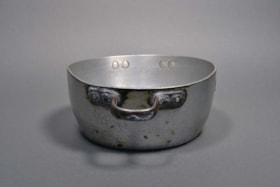Narrow Results By
Eared aluminum bowl with handles
https://www.cjhn.ca/link/cjhn47596
- Collection
- Montreal Holocaust Museum
- Description Level
- Item
- Material Type
- object
- Physical Description
- Bowl : cast (moulded), pegged, forged, beveled, soldered : silver, black ; Ht: 8 cm x W: 17,7 cm x De: 25,2 cm
- Date
- 1939-1945
- Collection
- Montreal Holocaust Museum
- Description Level
- Item
- Material Type
- object
- Physical Description
- Bowl : cast (moulded), pegged, forged, beveled, soldered : silver, black ; Ht: 8 cm x W: 17,7 cm x De: 25,2 cm
- Other Title Information
- Food Service T&E
- Date
- 1939-1945
- Physical Condition
- Good
- Notes
- Round, bowl. Rectangular, beveled, handles are attached to the left and right sides. Narrative: Item was used by Helen (nee Firse) and her two sisters (Rose and Bela) in Stutthof concentration camp and perhaps earlier in Auschwitz, they were originally from Lodz, liberated by Russian Army. The German phrase kaiserlich und königlich, typically abbreviated as k. u. k., k. und k., or k. & k., stands for "imperial and royal". It refers to the Court of the Habsburgs in a broader historical perspective. Some modern authors restrict its use to the so-called "Dual Monarchy" of Austria-Hungary from 1867 to 1918. During that period, it indicated that the Habsburg monarch reigned simultaneously as the Emperor of Austria and as the King of Hungary, while the two territories were joined in a real union. Analyzing official documents issued between 1867 and 1918, the used abbreviation is providing information on the lands targeted. k.k. in this era means: Austrian part of the dual monarchy only, Hungary not involved.
- Accession No.
- 2011X.253.01
- Name Access
- Pokorsky, Helen
- Places
- Stutthof, Poland, Europe
- Archival / Genealogical
- Archival Descriptions
- Repository
- Montreal Holocaust Museum
Images
{{ server.message }}


